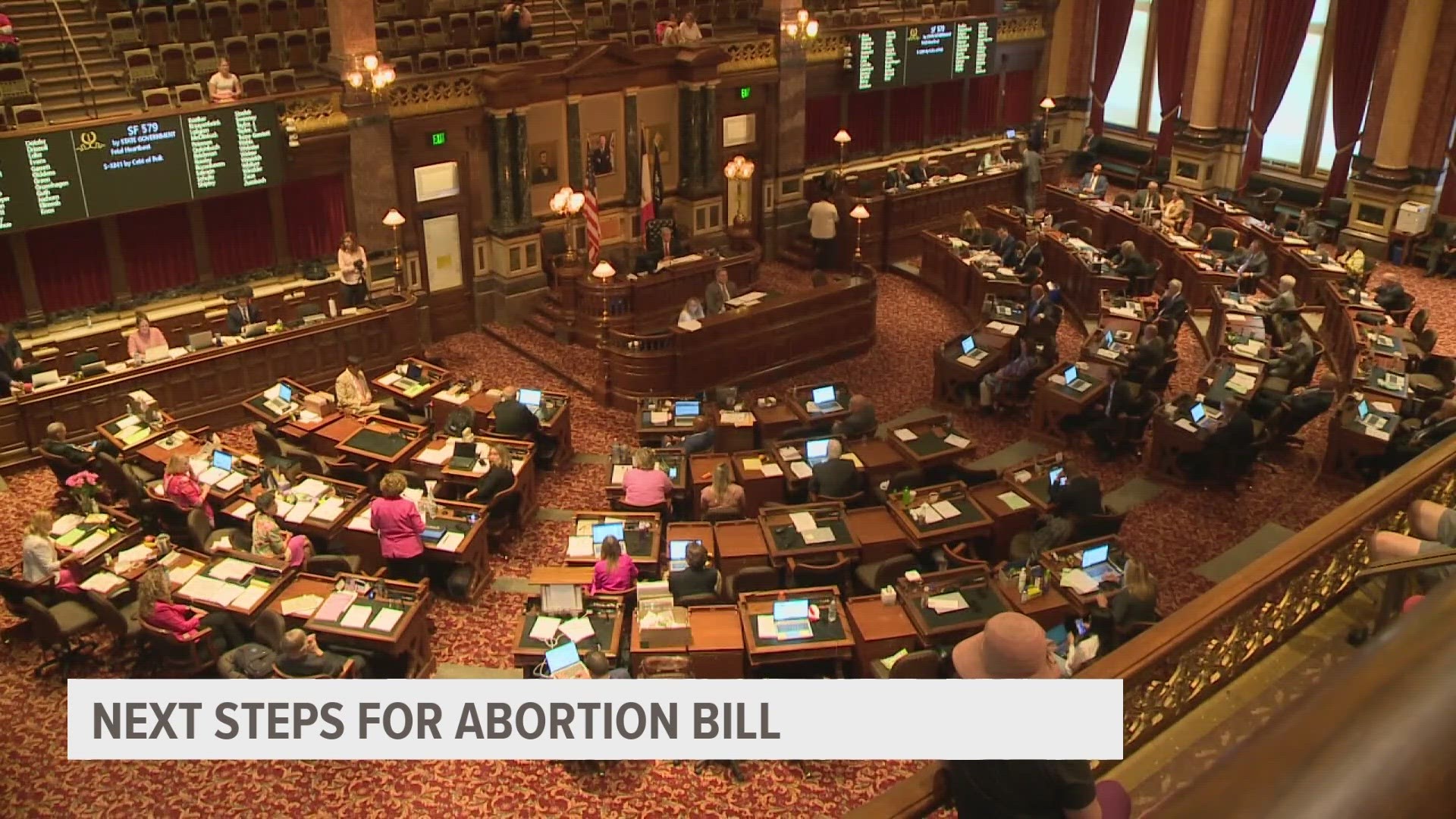DES MOINES, Iowa — A legal challenge was filed Wednesday to block Iowa's new legislation banning most abortions after roughly six weeks of pregnancy, launching what will likely be a lengthy and emotional court battle just hours after the Legislature's late-night vote.
The bill was passed with exclusively Republican support in a rare, one-day legislative burst lasting more than 14 hours. That's despite the vocal — and sometimes tense — objections from Democratic lawmakers and abortion advocates protesting at the Capitol.
Gov. Kim Reynolds says she will sign the bill, which would take immediate effect, on Friday.
The challenge, filed by the ACLU of Iowa, Planned Parenthood North Central States and the Emma Goldman Clinic, requests that a district court temporarily put the soon-to-be law on hold as the courts assess its constitutionality.
Abortion is currently legal in Iowa up to 20 weeks of pregnancy, but that would change with the stroke of Reynolds' pen Friday. The new legislation prohibits almost all abortions once cardiac activity can be detected, which is usually around six weeks of pregnancy and before many women know they are pregnant.
Reynolds ordered the rare session after the state Supreme Court declined in June to reinstate a practically identical law that she signed in 2018.
“The Iowa Supreme Court questioned whether this legislature would pass the same law they did in 2018, and today they have a clear answer," Reynolds said in a statement. "The voices of Iowans and their democratically elected representatives cannot be ignored any longer, and justice for the unborn should not be delayed.”
Sally Frank, a Drake University law professor who spoke against the bill during Tuesday's public hearing, explained why the bill is headed back to the courts.
"So the real problem in the case [is] that the Supreme Court ruled on, or basically didn't rule on, a few weeks ago was an attempt to reopen an injunction in a case that hadn't been appealed," Frank said. "And that was a very strange procedure."
In that split Supreme Court ruling, Justice Waterman's opinion said the procedural issues would fall away if the Legislature enacts a new abortion law.
"They have never ruled on the heartbeat bill in Iowa, the first time it was it was struck down at a district court level, but it never it was not appealed to the appellate court or the Supreme Court. So, they didn't rule on it. And this time, they're ruling on a procedural motion of whether the lift an injunction and they said we're not going to lift an injunction. And we're not even going to rule on the underlying heartbeat bill," said Republican Sen. Jack Whitver of Polk County.
Planned Parenthood North Central States has said they will refer patients out of state if they’re scheduled for abortions in the next few weeks. The organization, the largest abortion provider in Iowa, will continue to provide care to patients before cardiac activity is detected.
But the organization's preparations for legal challenges were underway well before the final votes Tuesday.
“The ACLU of Iowa, Planned Parenthood, and the Emma Goldman Clinic remain committed to protecting the reproductive rights of Iowans to control their bodies and their lives, their health, and their safety —including filing a lawsuit to block this reckless, cruel law,” ACLU of Iowa Executive Director Mark Stringer said in a statement.
There are limited circumstances under the measure that would allow for abortion after that point in a pregnancy where cardiac activity is detected — such as rape, if reported to law enforcement or a health provider within 45 days; incest, if reported within 145 days; if the fetus has a fetal abnormality “incompatible with life;” and if the pregnancy is endangering the life of the pregnant woman.
A district court found the 2018 law unconstitutional in 2019 based on rulings by the U.S. Supreme Court and Iowa’s Supreme Court that had affirmed a woman’s fundamental constitutional right to abortion.
After both bodies overturned those rulings last year, the governor sought to reinstate the 2018 law. But the state’s high court deadlocked last month without ruling on the merits of an abortion ban, leaving that law permanently blocked and leaving open the question of how the courts would rule on a new one.
"There are many Iowans who are concerned about a state not protecting the unborn with a beating heart, because there are Iowans concerned about fears over what might be coming forward. So I'll be watching it, of course," said Republican Sen. Amy Sinclair of Wayne County.
Most Republican-led states have drastically limited abortion access in the year since the U.S. Supreme Court overturned Roe v. Wade and handed authority on abortion law to the states. More than a dozen states have bans with limited exceptions and one state, Georgia, bans abortion after cardiac activity is detected. Several other states have similar restrictions that are on hold pending court rulings.

